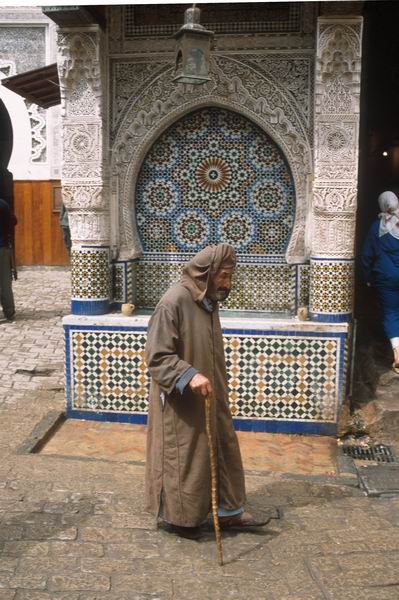
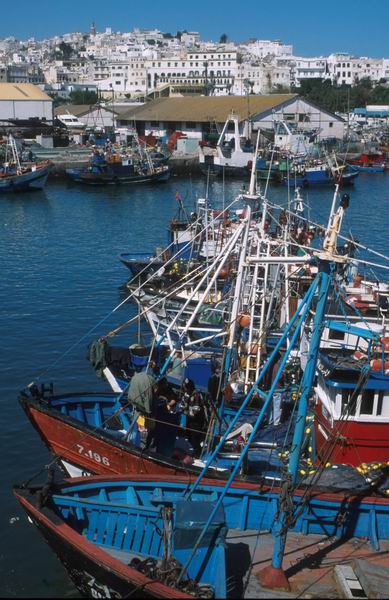
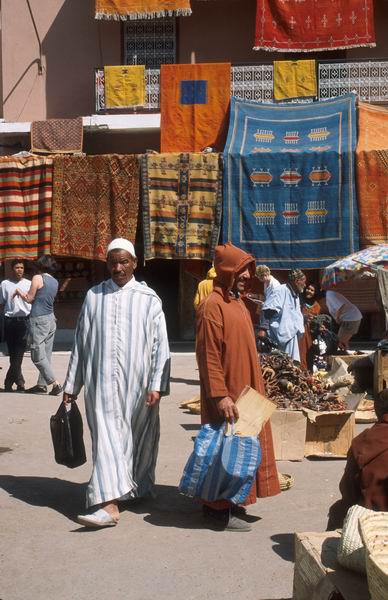
MOROCCAN
MAGIC
by LIZ BARRY
In
my travels across the world I have been fortunate to see some
wonderful sights and meet a whole host of interesting people..... from
Alaskan children playing on a beach at the edge of the
Arctic
in the eerie light of the
midnight
sun ..... spending time with the Jewish Community in
Brooklyn New York, visiting their homes and participating in their
family celebrations....... sitting on the baked earth floor of a
desert dwelling in Rajasthan, (India) eating breakfast with the
village women, who at sunrise walk the sands in search of kindling for
their cooking fires.....and seeing the white toothed smiles of three
young boys playing in the townships of Johannesburg, a ray of hope in
the stark landscape of tin shed dwellings and barbed wire fences.
These
snap shots of my experiences begin to tell the story of why I travel
and take pictures, not only to share my adventures but to capture the
essence of what is here today so others can see tomorrow.
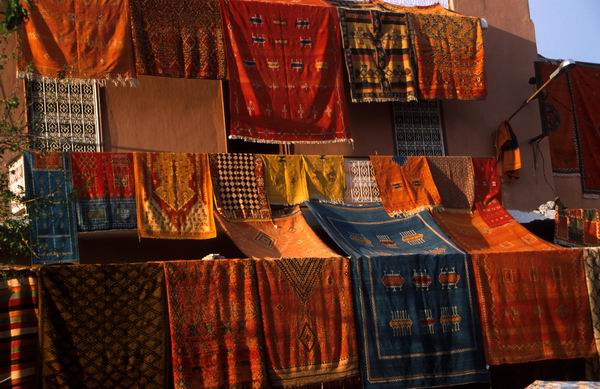
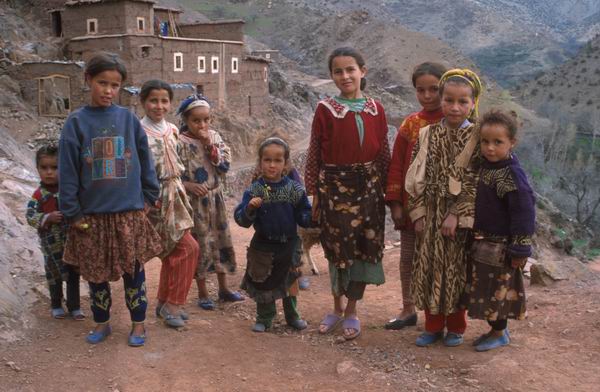
Morocco
April 2002
Morocco
is a country of contrasts, a taste of
Africa
against a backdrop of Islamic culture. Exotic
sights, which take you on a journey, back through time as you wander
the labyrinth of streets in the medinas,
trek climb and ski in the mountains or venture into the desert by 4
wheel drive.
My
travels began in the coastal town of
Tangiers
, which commands a strategic site on the
Strait
of
Gibraltar
. Tangier is a mix of Moroccan and European
culture. Uphill from the port is the medina; the streets lead through
to the Grand Succo, which is the centre of
life and a link to the new town. The Ville Nouvelle (new town) saw its
heyday in the 1930’s and is largely unchanged. A good way to
experience this is to sit in one of the street cafes or patisseries
along the Blvd Pasteur. And in the evening walk along the Terrasse des
Paresseux (Idlers Terrace) that provides a panoramic view over the
port,
Gibraltar
and
Spain
, a place where the locals come for an evening
promenade.
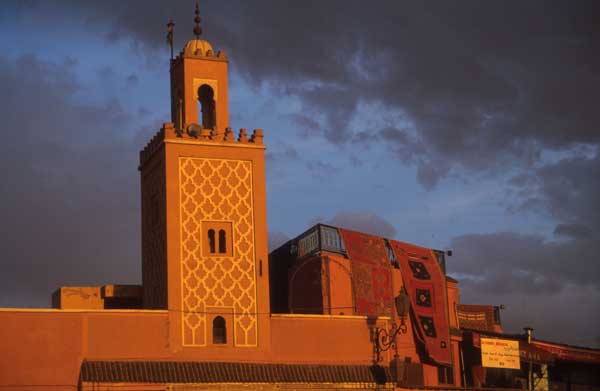
After
a day in Tangiers it was time to catch a berth on the Marrakesh
Express for a ten and a half hour ride through the night.
Marrakesh
moves to a different beat sitting at the gateway
to the desert, against a backdrop of the snow capped
Atlas Mountains
. The most famous landmark is the Koutabia
Mosque 70m high, which can be seen for miles in any direction,
attached is a paved and flower garden offering a quiet respite.
The street opposite leads into the wide-open
square
of
Djemma
el-Fna. During the day juice sellers and stalls of
fresh figs and dates surround it. As the sun begins to set the red
earth walls surrounding the medina illuminate, food stalls move in,
smoke begins to rise and the aromas of fresh fish; brochettes
(skewered meat) and steaming snails mingle in the air. Acrobats,
jugglers, storytellers and musicians commence the street cabaret.
Surrounded by potions are the herbalists, veiled women offer henna
tattoos and the haunting melody of snake charmers carry deep into the
night. If this sounds too much you can sit at one of the rooftop
restaurants and watch the scene unfold.
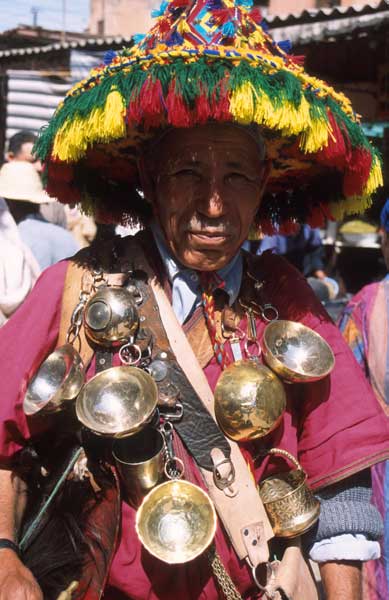
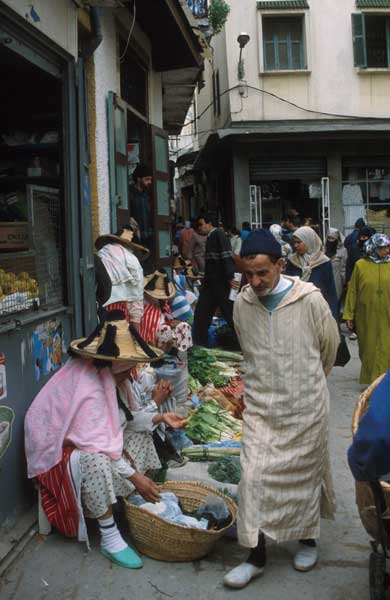
The
souqs of Marrakech offer a wide variety of
crafts, leather, silverware, pottery also carpets and kilims,
wall hangings made by Berber women. As you wander the streets you will
be able to watch craftsmen at work usually in a narrow opening of a
shop or small courtyard. At the dyers souk
multi-coloured wools and fabrics hang out to dry.
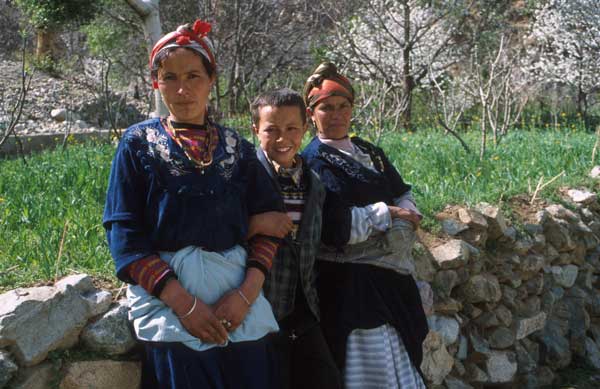

Souqed
out it was time to venture into the countryside. Hiring a 4wheel drive
accompanied by Brahim, a Berber, our
driver and translator, we went into the High Atlas.
The mountain villages are home to the Berber tribes
people, their mud brick dwellings cling precariously to the
mountainsides. Like mountain goats the children race sure-footed
across slopes. Some areas are more fertile; this enables the people to
grow wheat, fruit trees and other crops, also grazing for a cow and
some sheep.
We
stayed in Imlil a small town in the
Mizane
Valley
. This area is popular for trekking, it contains
the highest peaks of the region Jebel Toubkal 4167m.The night was
crisp the snow capped mountains glistened, from the rooftop of our
small hotel you could hear laughter accompanied by a drum beat echoing
from the villagers homes.
It
was hard to leave behind the blossoming fruit trees and crystal clear
mountain streams for a city but
Fes
was calling. The medina of Fes
el Bali, is one of the largest living
medieval cities of the world with a maze of 9400 streets and
alleyways. The only form of transport along the cobbled streets is the
mule, listen out for the drivers cry or be knocked off your feet by
its load. By following your nose you’ll find the tanneries. A sprig
of mint helps to sweeten the odour. From a terrace above a leather
shop you catch watch the men dipping the hides into the vats of
coloured dye. Bags, jackets and babouches
(slippers) the most common footwear worn by both sexes are
made from the leather.
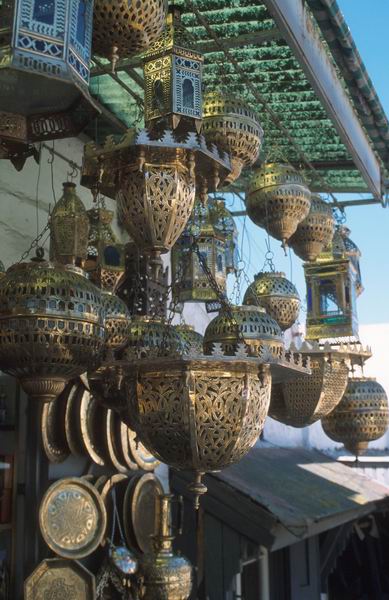
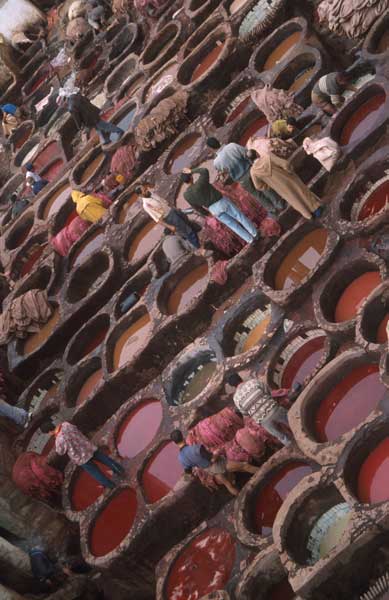
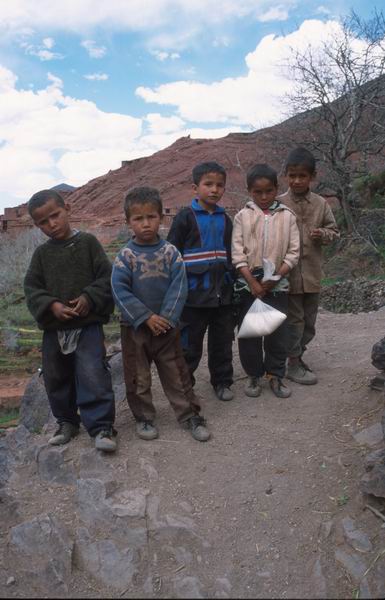
In
the midst of the medina is the Kairaouine Mosque and University, the
mosque is said to hold 20,000 people. Staying within the walls of the
medina you will be guaranteed to rise early, woken before dawn by the
by muezzin (mosque official) calling the faithful to prayer.
The
trip had meant several early mornings to fit everything in. I left
Morocco
knowing one day I shall return as this trip just
touched the surface of a country with a long history and so much to
discover. The people are friendly, hospitable and will constantly ask
you to share a mint tea. There’s tasty food such as Couscous and Tajines,
(meat or vegetable stew) served in a conical earthenware dish. The souqs
offer plenty of bargains you just have to get your bartering skills up
to scratch before you go. And it is easy to travel around all you need
are a few words of French a little Arabic if not hand gestures and a
smile and you’ll have an experience to remember.
Home












